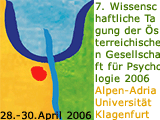




Programmabfrage
|
Programmübersicht —
Keynotes —
Fr, 28.4. —
Sa, 29.4. —
So, 30.4. | ||
|
Bitte wählen Sie aus nachstehender Liste einen Programmpunkt aus und klicken Sie anschließend auf "Anzeigen". | ||
| Hinweis: Um festzustellen, wann Ihr Beitrag programmiert wurde, wählen Sie in obiger Liste den Menüpunkt 'alle Beiträge' und klicken auf 'Anzeigen'. Suchen Sie dann mit der Browserfunktion (Strg+F) nach Ihrem Namen! | ||
| Ihre Auswahl: Keynote 1
| ||
| Fr, 10:00-10:30, Robert-J.-Sternberg-Saal | Keynote 1 | |
| Helmut Leder Empirical Aesthetics: Psychology of Art Although aesthetic experiences are frequent in modern life, there is as yet no scientifically comprehensive theory that explains what psychologically constitutes such experiences. These experiences are particularly interesting because of their hedonic properties and the possibility to provide self-rewarding cognitive operations. We shall explain why modern art\'s large number of individualised styles, innovativeness and conceptuality offer positive aesthetic experiences. Moreover, the challenge of art is mainly driven by a need for understanding. Cognitive challenges of both abstract art and other conceptual, complex and multidimensional stimuli require an extension of previous approaches to empirical aesthetics. We present an information-processing stage model of aesthetic processing. According to the model, aesthetic experiences involve five stages: perception, intrinsic classification, extrinsic classification, cognitive mastering, and evaluation. The model differentiates between aesthetic emotion and aesthetic judgements as two types of output. Here we present recent findings which support the model`s prediction that aesthetic appreciation of art depends on expertise and affect. Moreover, future research questions that will challenge the model`s basic structure are discussed. | ||
| 09.07.2025 10:02:36 | best viewed with Opera ra pinxit |